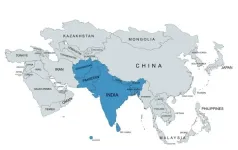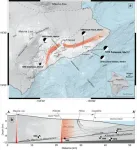(Press-News.org) A series of five papers, published today in The Lancet Oncology by a University of Pittsburgh-led international team, highlights critical public health challenges related to cancer control in the eight countries that form the South Asian Association for Regional Cooperation (SAARC) and the Rohingya refugee population in Bangladesh. The series underscores barriers contributing to significant disparities in cancer outcomes and identifies actionable solutions to address these challenges in one of the most comprehensive efforts to understand this region’s cancer burden.
The papers call for a comprehensive, coordinated approach to address the cancer burden in SAARC countries — Afghanistan, Bangladesh, Bhutan, India, the Maldives, Nepal, Pakistan and Sri Lanka — which are home to more than 1.92 billion people. The authors urge policymakers and other stakeholders to implement culturally sensitive approaches to improve cancer prevention, screening, early detection and treatment in this region.
Although cancer incidence rates in SAARC countries are lower compared to the rest of the world, mortality rates are higher. Cancer incidence is on the rise, with lung, breast, oral and cervical cancers the most common. This is largely due to late-stage diagnoses because of a severe shortage of early detection programs, limited access to treatments and inadequate healthcare infrastructure.
These issues are compounded in refugee settings, particularly among the nearly one million Rohingya population living in refugee camps in Cox’s Bazar, Bangladesh, where overcrowded camps, limited resources, inadequate infrastructure and political barriers worsen the situation.
“In the SAARC countries, we face a critical shortage of trained oncology professionals, limited healthcare infrastructure and significant healthcare disparities between urban and rural regions, all of which impact access to high quality cancer care,” said corresponding author Saiful Huq, Ph.D., professor in the Department of Radiation Oncology at the University of Pittsburgh School of Medicine and director of the Medical Physics Division at UPMC Hillman Cancer Center. “There is a tremendous need for effective interventions to improve care across the entire cancer continuum – from prevention and diagnosis to treatment and palliative care for people living in these countries, which is almost one quarter of the world’s population.”
In the series of papers, Huq and his coauthors describe barriers specific to each SAARC country and those that are common across the region. These include a lack of awareness about cancer symptoms, risk factors such as smoking and chewing betel nut, cultural stigmas, myths that cancer is untreatable or contagious, lack of access to health care facilities in rural and remote areas, financial difficulties faced by many patients and their families and insufficient government investment in cancer care.
A major barrier to cancer care is the shortage of trained cancer care professionals in SAARC nations — including oncologists, medical physicists, radiation technologists and oncology nurses —driven by insufficient educational and training programs. Additionally, the SAARC countries face disparities in cancer research funding and a lack of infrastructure to support large-scale comprehensive cancer treatment efforts.
“SAARC nations face a myriad of challenges in providing accessible and equitable cancer care to their diverse populations,” said Huq. “As a first step to addressing these challenges, there is an urgent need to strengthen each country’s national cancer control program in order to develop strategies to upgrade health care infrastructure, particularly in rural and underserved areas, and investing in the training, education and retention of skilled healthcare professionals.”
Other key recommendations include expanding cancer registries to improve data collection that will inform policy decisions for cancer control efforts and strengthen research capacity; launching public health campaigns to promote prevention; promoting early detection and awareness of cancer risk factors; and fostering regional collaboration and partnerships to ensure better access to cancer treatment. The papers emphasize that regional networks could play a significant role in advocacy and resource mobilization, particularly for countries with limited health care budgets.
Among the Rohingya refugee population, cancer — particularly hepatocellular carcinoma, oral cancer and cervical cancer — is a rising concern. The papers call for culturally sensitive and multi-pronged interventions to address these issues, including partnerships with local leaders and communities to raise cancer awareness, reduce stigmas, improve health literacy and strengthen capacity for cancer screening, treatment and palliative care.
To raise awareness and drive policy changes, Huq will launch this series of papers on December 12 at the Global Health Catalyst Summit in Bangladesh to an audience that will include Nobel laureate Muhammad Yunus, chief advisor of the Interim Government of Bangladesh; ambassadors from SAARC countries; and other stakeholders.
“The dedication of Dr. Huq and the entire Global Health Catalyst to improving cancer care around the globe is truly amazing and I was honored to have the opportunity to collaborate with him in highlighting this critical issue,” said coauthor Heath Skinner, M.D., Ph.D., professor and chair of the Department of Radiation Oncology at the Pitt School of Medicine and chief medical officer of the Radiation Oncology Network of UPMC Hillman.
Other authors of the series are listed in The Lancet Oncology papers online.
This research was supported by funding from the National Institutes of Health awards R25CA288263 and R13CA257481 supporting the Global Health Catalyst and the Department of Radiation Oncology at the Pitt School of Medicine.
END
Five new papers highlight cancer inequities, challenges and opportunities in South Asia
2024-12-03
ELSE PRESS RELEASES FROM THIS DATE:
Stereotypes matter: Computer science needs better role models
2024-12-03
White, male, billionaire entrepreneurs fuel stereotypes that compound the issues surrounding diversity in technology and computer science, according to a new study.
The identities of famous people contribute a lot to stereotypes in their respective domains. Prominent public figures can easily become influential to young people. But are these role models effective for creating a diverse community of computer science students? That, at this point in time, seems unlikely.
The study, carried out by the University of Reading and published today ([INSERT DATE]) in the Oxford Review of Education, ...
Insect fossil find ‘extremely rare’
2024-12-02
Newly discovered insect fossils are so small they can barely be seen by the human eye but have been preserved in an “extraordinary” way.
Published in the journal Palaeobiodiversity and Palaeoenvironments, a new study reveals rare whitefly insect fossils have been found in Miocene age crater lake sediments at Hindon Maar, near Dunedin.
Adult whiteflies are tiny insects about 3mm in size, smaller if they are immature.
The fossils found at Hindon Maar are about 1.5mm by 1.25mm and have been preserved in the position they lived and died, attached to the underside ...
New JAMA study shows text messages can be ineffective as medication refill reminders
2024-12-02
A new study published today in JAMA reveals text message reminders for patients who delay refilling their medications didn’t help improve how regularly they refilled medications over a year.
The study enrolled over 9,000 patients in a randomized pragmatic clinical trial and included representation from a diverse population across subgroups, including females, Hispanic ethnicity and Spanish-speaking patients, all groups who can be traditionally underrepresented in clinical trials.
“There are a lot of studies that focus on using technology ...
Migrant pupils need more targeted mental health support in school, study shows
2024-12-02
School-based mental health support should be more accessible for migrant children, a new study says.
Schools are increasingly considered to be critical places for identifying and supporting mental health difficulties, but little is known about the barriers migrants face in accessing mental health support in schools.
Researchers found a lack of targeted school-based mental health interventions designed specifically for young migrants that cater to their unique strengths, resilience and needs.
The review of 38 studies shows that stigma around mental health and stressors associated with migration were among ...
Unveiling a century of stress and deformation: Insights from Kīlauea Volcano’s 1975 earthquake
2024-12-02
Researchers from the University of Hawai‘i at Mānoa Department of Earth Sciences assessed an unprecedented 120 years of data from Kīlauea Volcano on Hawai‘i Island, uncovering, for the first time, century-spanning patterns of deformation and stress changes. They had a particular focus on the transformative 1975 magnitude 7.7 Kalapana earthquake, which also resulted in a 20-foot high tsunami. Their study was published recently in the Journal of Geophysical Research: Solid Earth.
“Deciphering Kīlauea's history deepens our understanding of volcanic and seismic hazards,” said lead author Lauren Ward ...
Pregnancy enhances natural immunity to block severe flu
2024-12-02
McGill University scientists have discovered that pregnancy may trigger a natural immunity to boost protection against severe flu infection.
Contrary to the common belief that pregnancy increases vulnerability to infections, researchers found that it strengthened an immune defense in mice, blocking the Influenza A virus from spreading to the lungs, where it can cause severe infection.
“Our results are surprising because of the current dogma, but it makes sense from an evolutionary perspective,” said co-lead author Dr. Maziar Divangahi, ...
Deep-sea marvels: How anglerfish defy evolutionary expectations
2024-12-02
A groundbreaking Rice University study sheds light on the extraordinary evolution of anglerfish, a group of deep-sea dwellers whose bizarre adaptations have captivated scientists and the public alike. The research, published in Nature Ecology & Evolution, uncovers how these enigmatic creatures defied the odds to diversify in the harsh, resource-poor environment of the bathypelagic zone — part of the open ocean that extends from 3,300 to 13,000 feet below the ocean’s surface.
Led by a team of biologists including Rice’s ...
Using race and ethnicity to estimate disease risk improves prediction accuracy but may yield limited clinical net benefit
2024-12-02
Embargoed for release until 5:00 p.m. ET on Monday 2 December 2024
@Annalsofim
Below please find summaries of new articles that will be published in the next issue of Annals of Internal Medicine. The summaries are not intended to substitute for the full articles as a source of information. This information is under strict embargo and by taking it into possession, media representatives are committing to the terms of the embargo not only on their own behalf, but also on behalf of the organization they represent.
----------------------------
Using ...
Sir Gustav Nossal Professor of Immunology to honor giant of Australian science
2024-12-02
The exceptional research, discovery and advocacy legacy of former WEHI director and Australian treasure Sir Gustav Nossal AC CBE will continue through an ongoing professorship, announced today by WEHI and the Nossal family.
Launched with a generous gift from the Nossal family, the Sir Gustav Nossal Professor of Immunology is a prestigious new position that will lead pivotal research to advance human immunology.
An international search is now underway for an outstanding candidate who will become the first Nossal Professor, a role that will build on Sir Gus’ ...
CMS launches new mandatory kidney transplant payment model
2024-12-02
INDIANAPOLIS -- A new final rule issued by the Centers for Medicare and Medicaid Services and the U.S. Department of Health and Human Services this week for a mandatory alternative payment model called the Increasing Organ Transplant Access (IOTA) Model aimed to improve the number of life-saving kidney transplants for patients whose kidneys have failed. The new rule will test whether performance-based upside or downside risk payments among a selected subset of kidney transplant hospitals increase access to kidney transplants for patients with end-stage kidney disease while maintaining or improving the quality of care and reducing Medicare ...


